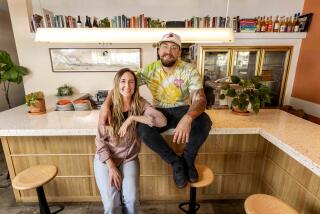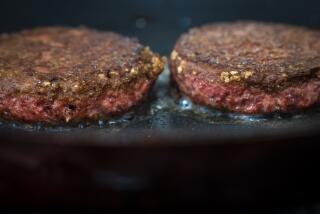Overhill Alters Recipe for Growth
- Share via
When the airline industry nose-dived after the Sept. 11, 2001, terrorist attacks, food preparer Overhill Farms Inc. was hit particularly hard.
Vernon-based Overhill relied on airlines as a major buyer of its prepared meals. It supplied American, Delta and Northwest, as well as United Airlines before that carrier filed for bankruptcy protection.
As travel fell and these carriers cut expenses by reducing or eliminating meals, Overhill’s airline food sales slid to $35 million in its 2002 fiscal year ended Sept. 30, from $54.7 million the previous year.
To make up for those lost sales, the company has been pushing to supply more restaurants and retailers, as well as its longtime customers, such as diet center operator Jenny Craig Inc. Overhill has had some success, but like many of the airlines, it remains financially troubled.
For the six months ended March 30, the company swung to a $2.4-million loss, from a profit of $398,343 in the same period a year earlier. Although Overhill’s sales during that six-month period grew 6% to $71.6 million, the company was facing a big cash crunch and rising debts.
Over the last 12 months, Overhill’s stock has fallen from a high of $3 to 81 cents Friday, down 9 cents, on the American Stock Exchange.
The company’s shareholders are having their annual meeting today. They are unlikely to hear encouraging news about Overhill’s airline business.
“I think we have to plan for the worst-case scenario” with the airlines, Overhill Chief Executive James Rudis said last week. “We are going to target other portions of our business for more significant growth.”
In particular, Overhill is hoping to ride a wave of expansion with restaurant chain Panda Express, a customer of several years. The chain, owned by Rosemead-based Panda Restaurant Group Inc., is planning to open 108 new locations this year. Overhill marinates, chops, breads and partially cooks Panda’s orange-flavored chicken dish before shipping it to the restaurants, where it is heated with sauce and vegetables.
In addition, after years of making grab-and-go meals for grocer Albertson’s Inc., Overhill recently cut a deal to make private-label dinners for Safeway Inc. and also has begun selling meals under its Chicago Brothers brand to Costco Wholesale Corp. stores.
“The company has faced some pretty severe challenges and come through all of them,” said Arthur Levine, founding partner of Beverly Hills-based Levine Leichtman Capital Partners, which owns 37% of Overhill and manages $700 million in institutional funds. “We think it’s an outstanding company with great prospects.”
Overhill was formed in 1995, after its parent TreeCon Resources Inc., an Addison, Texas-based logging equipment distributor, bought Vernon-based IBM Foods. At that time, the company relied on American Airlines and Jenny Craig for 58% of its sales.
In the late 1990s, the firm expanded its airline customers, and in 2000 it made its first move into retail sales, buying the Chicago Brothers brand.
In September, TreeCon spun off Overhill to shareholders at $3 a share. Rudis, who had served as chairman, president and chief executive of TreeCon, took on those roles at Overhill.
The company’s debt became a serious issue this year, as $12.6 million from a revolving line of credit was coming due to its primary lender, Union Bank of California, as was its $24.7- million loan from Levine Leichtman.
After Overhill failed to renegotiate with Union Bank, Levine Leichtman stepped in to acquire the company’s note from the bank. It extended to Overhill $5 million in bridge financing, which expires next year, in exchange for additional shares in the company, which raised Levine Leichtman’s stake to 37% from 24%.
But Overhill is paying a hefty 10% and 15% interest on some of its debt, which puts added pressure on the company to keep adding new business to improve its cash flow.
Rudis said the debt refinancing was painful but necessary to consolidate Overhill’s network of five outdated plants into two efficient facilities. “If we hadn’t done that deal, I don’t think we’d be here today,” he said.
Overhill’s new 170,000-square-foot plant in Vernon, though costly, should save the company several million dollars a year and allow it to prepare its meals more efficiently, Rudis said.
At Overhill’s assembly lines, computers keep track of almost 300 active recipes and electronically adjust them to meet the different needs of its customers, whether it’s a low-fat, low-calorie meal for Jenny Craig or a rich pasta dinner for Albertson’s.
More than 120 plastic trays of lasagna, pot pies and other meals roll down assembly lines each minute, getting measured squirts of sauce, cheese and a sprinkling of meat from workers in white laboratory coats. Each item is X-rayed and weighed to make sure it measures up to the recipe specifications before being stacked into boxes, frozen and shipped out, either to the airlines or retailers.
“The drive,” Rudis said, “is always for consistency.”
More to Read
Inside the business of entertainment
The Wide Shot brings you news, analysis and insights on everything from streaming wars to production — and what it all means for the future.
You may occasionally receive promotional content from the Los Angeles Times.










